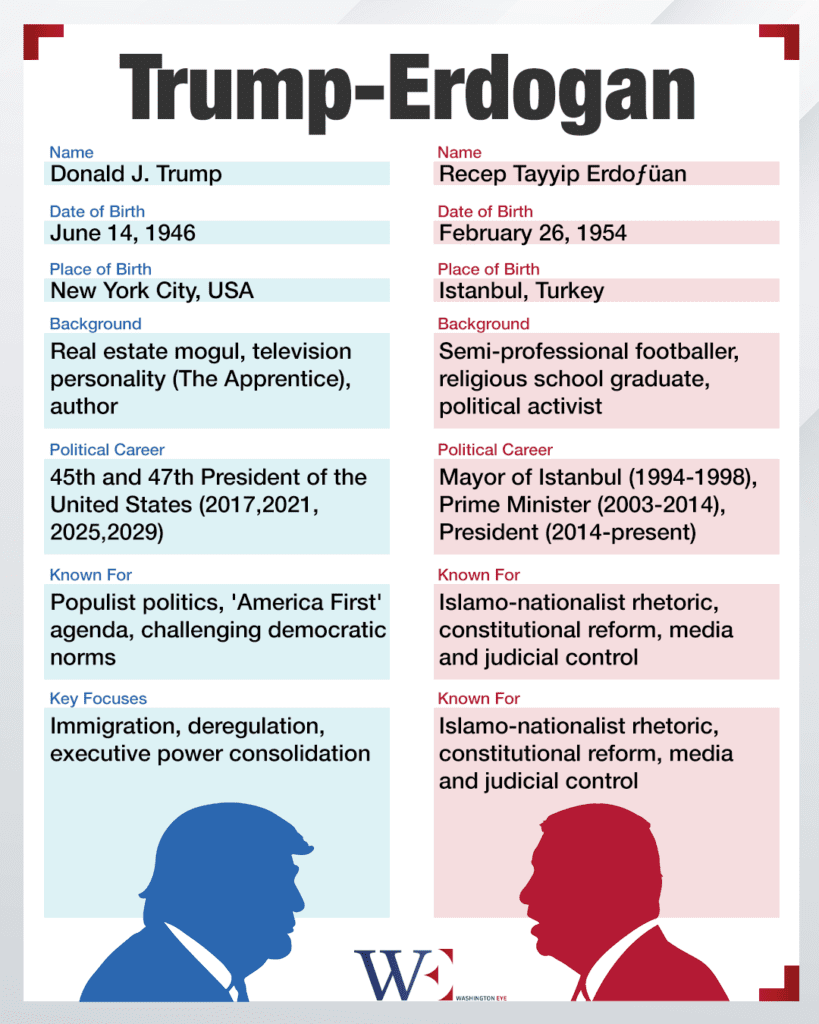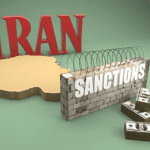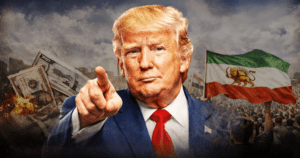Recep Tayyip Erdoğan began as an underdog. Born in a modest Istanbul neighborhood, he sold bread on the streets as a boy. His ascent was swift: from footballer to mayor, from prisoner to prime minister, and ultimately to president. Over more than two decades, Erdoğan has meticulously constructed a system in Turkey where his authority often supersedes the institutions designed to balance it.
Donald J. Trump was born into wealth and luxury. A real estate mogul and reality TV star, his rise wasn’t about overcoming obscurity but about crafting a narrative. Yet, in 2025, during his second term, Trump mirrors Erdoğan’s playbook: rewriting laws, undermining the judiciary, prioritizing loyalty over merit, and—most provocatively—laying the groundwork to remain in power beyond his constitutionally limited term.
Parallel Histories: The Boy from Kasımpaşa and the Tycoon from Queens
Erdoğan’s formative years in Istanbul shaped his populist approach. He positioned himself as the champion of the marginalized, a devout man standing against secular elites. His 1994 election as Istanbul’s mayor catapulted him into national prominence. Even imprisonment couldn’t halt his momentum. Banned from politics in 1998, he returned triumphantly in 2002 when his Justice and Development Party (AKP) secured a parliamentary majority.
Trump built a brand centered on spectacle. From tabloid headlines to primetime television, he cultivated the image of a dealmaker. His 2016 victory was dismissed by some as a fluke. But Trump recognized—as Erdoğan did—that politics is not just about governance; it’s about performance. Playing the outsider, the strongman, the persecuted, he seized power not through institutions, but through narrative.
Systemic Rewrites and Executive Power
Erdoğan has repeatedly altered Turkey’s constitution to consolidate executive authority. After the failed 2016 coup, he purged the military, judiciary, and civil service—an institutional cleansing that fortified his control.
Trump has adopted a more procedural route, using executive orders and administrative restructuring. Since January 2025, he has reinstated “Schedule F” to remove civil servants and install loyalists, fired Inspectors General, and removed key legal safeguards, including rolling back anti-bribery rules for American companies overseas. His administration has also created the “Department of Government Efficiency,” influenced by Elon Musk, which has initiated major changes across federal agencies. While Musk holds no formal title, he has placed allies in senior roles at the Office of Personnel Management (OPM), reshaping hiring and firing practices.
Judicial Pressure and Recalibrating the Courts
Erdoğan’s long-term strategy involved placing loyalists in Turkey’s judiciary. Dissenting judges were removed, imprisoned, or silenced. Today, the Turkish judiciary rarely checks presidential power.
Trump, constrained by a more independent judiciary, has gone to war with it rhetorically and politically. Since his return to office, federal judges have issued at least 15 injunctions against executive orders, a historic high. Trump and his allies now argue that lower courts should be stripped of the power to block federal actions. In a striking incident, Trump publicly targeted a federal judge overseeing a deportation case, mirroring Erdoğan’s tactic of labeling dissenting judges enemies of the state.
The Oligarchy of Loyalty and Wealth
In Erdoğan’s Turkey, business and politics merged under loyalty. Government contracts and media empires were handed to allies. Those outside the fold found themselves marginalized or prosecuted.
Trump has similarly turned Washington into a boardroom of billionaires. His second-term Cabinet includes Howard Lutnick as Commerce Secretary and Scott Bessent at Treasury. Elon Musk, although unofficial, has emerged as a powerful influence shaping civil service reform. Together, this new oligarchy prioritizes ideological loyalty over experience, a move reminiscent of Erdoğan’s fusion of cronyism and control.
The Long Game: Extending Rule
Erdoğan has remained in power for over 20 years by reshaping constitutional limits, often under the guise of popular support. Term limits have been reinterpreted or removed entirely.
Trump is now exploring similar paths. The Third Term Project—a fringe yet increasingly vocal campaign—seeks legal avenues to enable Trump to serve beyond two terms. One floated strategy suggests he could run as vice president alongside a loyalist, only to assume the presidency later. While this would face serious constitutional hurdles, the mere existence of such discussion is telling. Once unthinkable, it is now part of the public discourse—much like Erdoğan’s early flirtations with constitutional change.
Shielding from Accountability
For both men, staying in power isn’t just about ideology or legacy—it’s also about protection. Erdoğan’s extended rule has kept corruption allegations buried under layers of state control. Trump, facing multiple investigations and lawsuits, has systematically dismantled oversight mechanisms, including watchdog roles and DOJ independence. In power, both leaders have insulated themselves from legal vulnerability.
Erdoğan and Trump hail from very different worlds, but they share a common instinct: that power, once gained, must be defended at all costs. In their eyes, the nation is not just something they lead—it is something they embody. And once that line is crossed, democracy becomes not a structure, but a story—told by the one who controls the stage.














